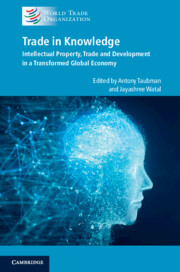Book contents
- Frontmatter
- Contents
- Figures
- Tables
- Contributors
- Preface
- 1 Thematic Overview: Charting the Evolution of Knowledge Flows
- Part I Conceptual Framework
- Part II Measuring Trade in Knowledge
- Part III Impact of Knowledge Flows on Trade and Development
- Part IV Policy, Regulatory and Legislative Frameworks
- Part V Looking Forward
- Index
24 - Fitting Machine-Generated Data into Trade Regulatory Holes
from Part IV - Policy, Regulatory and Legislative Frameworks
Published online by Cambridge University Press: 17 February 2022
- Frontmatter
- Contents
- Figures
- Tables
- Contributors
- Preface
- 1 Thematic Overview: Charting the Evolution of Knowledge Flows
- Part I Conceptual Framework
- Part II Measuring Trade in Knowledge
- Part III Impact of Knowledge Flows on Trade and Development
- Part IV Policy, Regulatory and Legislative Frameworks
- Part V Looking Forward
- Index
Summary
In an era when the Internet of Things has slowly transformed into the ‘Internet of Everything’, data generated or collected by networked sensors, interconnected devices, and intelligent machines have been highly valuable. In October 2017, the European Commission proposed a new sui generis data producer’s right for nonpersonal, anonymized machine-generated data. If countries began to create new rights in these data – whether based on the EU proposal or other proposals – the cross-border flow of such data would raise questions about the need for new trade standards. In view of this emerging trade policy debate, the present chapter highlights two sets of challenges concerning the development of new trade standards for regulating the cross-border flow of machine-generated data: (1) national policy development and (2) international norm setting. The chapter begins by identifying five sets of policy questions that have to be addressed before the creation of a new national regime for the protection of machine-generated data. The chapter then turns to the potential complications that would arise in the international norm-setting arena. Taken together, these two sets of challenges show how the protection, regulation, and overall governance of machine-generated data may not fit well with the existing international trade regime.
- Type
- Chapter
- Information
- Trade in KnowledgeIntellectual Property, Trade and Development in a Transformed Global Economy, pp. 738 - 768Publisher: Cambridge University PressPrint publication year: 2022



